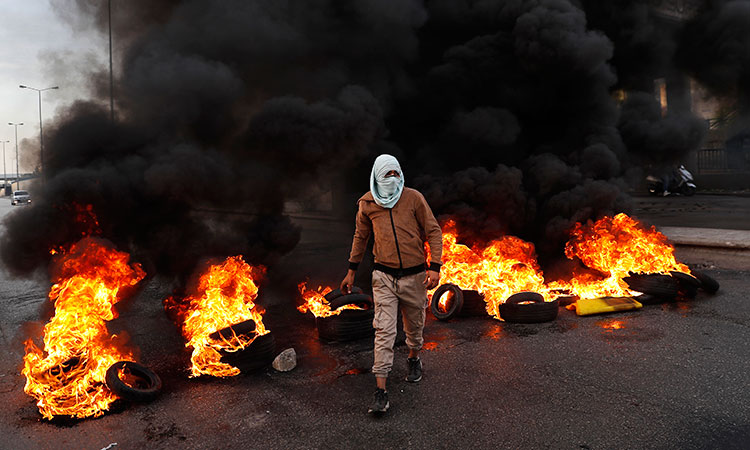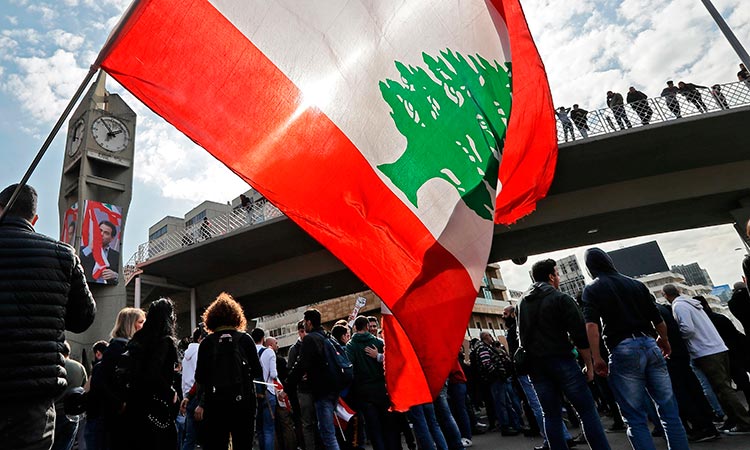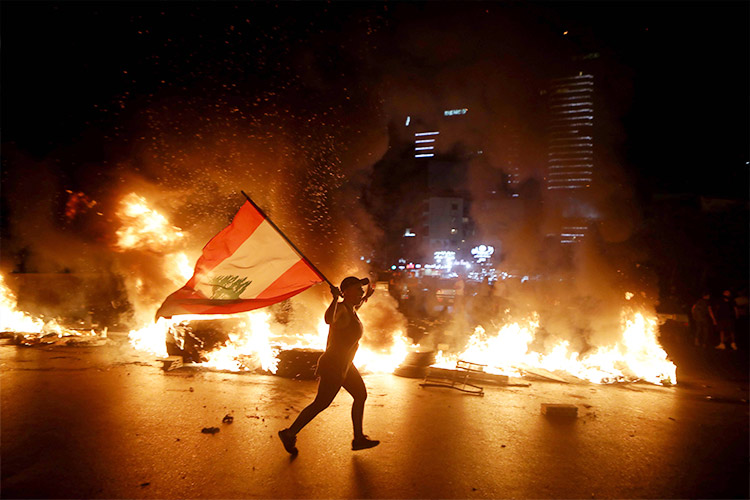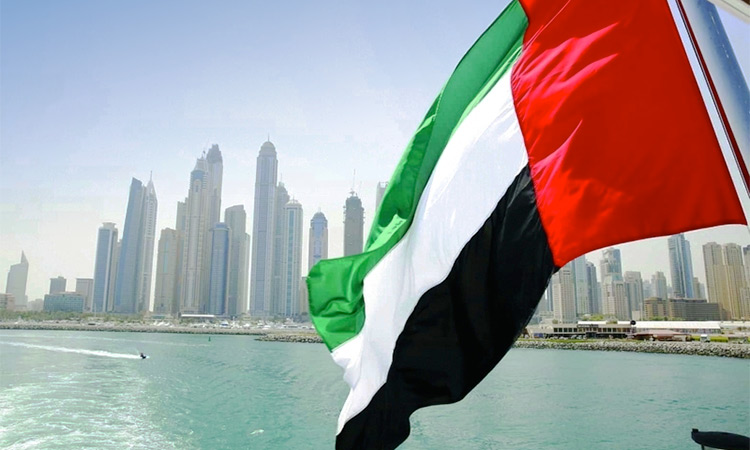For Lebanese, the status quo has become unbearable
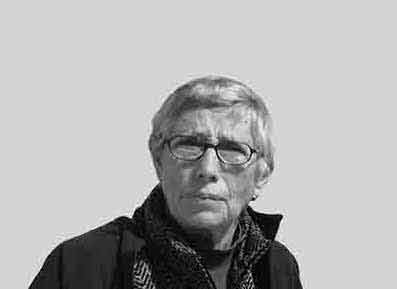
Michael Jansen
The author, a well-respected observer of Middle East affairs, has three books on the Arab-Israeli conflict.

Anti-government protesters wave national flags in the area of Jal el-Dib in the northern outskirts of the Lebanese capital of Beirut. AFP
His removal was the main demand of millions of Egyptians who took to the streets and squares across the country calling for “Bread, Freedom, and Justice.”
Once he was out of the way, the military took charge. Egyptians dubbed their mass rising a “revolution” but they did not demand the toppling of an entire political class or a change in the system of governance. These are the ultimate goals of Lebanese who have turned a protest against unjust taxation into a revolution against the corrupt sectarian regime that has reigned since Lebanon became independent in 1943.
As Lebanese marked the first month anniversary of their spontaneous protest movement, they counted only one martyr from a gun of a soldier. Three other fatalities did not involve the military or security forces. One protester was killed at a barricade on the Beirut airport road and two Syrian workers died when the building where they sheltered was torched on October 17th, the first night of protests. In Egypt, the toll was 845 killed by riot police and security agents during assaults on unarmed protesters.
Once Egyptians launched their uprising international satellite channels transformed it into a global drama, pitting civilians against a heavily armed regime determined to remain in power. There was no competition on the world stage. Today, there are mass protests in Iraq, Hong Kong, Chile, Bolivia, France, and Iran, all commanding the attention of the international community. Lebanon is just one of many countries in revolt.
Nevertheless, Lebanese revolutionaries are determined to continue mass action until their demands are met. They have, however, to contend with the deeply entrenched political class which is, rightly, frightened by the rise of people power. The politicians face exclusion from governance and investigations for corruption. Lebanese argue they should be punished for failing to rebuild Lebanon after the 1975-90 civil war and to provide the populace with water, electricity, schooling, jobs, and a clean environment.
Lebanese revolutionaries poured scorn on the agreement by President Michel Aoun, caretaker Prime Minister Saad Hariri, and representatives of the Shia Hizbollah and Amal movements to ask Muhammad Safadi to form a cabinet. A former deputy from Tripoli, Lebanon’s second city, who served in four corrupt ministries, Safadi is precisely the sort of figure the revolutionaries seek to overthrow. After protests erupted at his homes in Tripoli and Beirut, Safadi declined the appointment and added his name to three other former prime ministers — Najib Mikati, Fouad Siniora, and Tamam Salam — who called for Hariri to be reappointed.
He had given in to pressure although he had proposed a cabinet of technocrats. This would meet the demands of hundreds of thousands of Lebanese who have deliberately paralysed the country for a month and brought it to the brink of economic meltdown. But even the threat of economic and financial disaster has not persuaded the political class to give in to the revolutionaries.
The unexpected, unscripted uprising was triggered by a daily tax on free internet phone apps used widely in Lebanon because mobile phone charges are high.
The WhatsApp tax came on top of multiple taxes imposed in an austerity plan. This was intended to convince foreign donors to release $11 billion in grants and soft loans needed to rescue a country pillaged by the political class for three decades.
While the number of revolutionaries joining demonstrations has waxed and waned, Lebanese have not given up because they can no longer endure the status quo and tolerate mismanagement and corruption which forces their children to emigrate in search of jobs.
The revolutionaries are particularly incensed by the fact that most hated man among the politicians, Aoun’s son-in-law Gebran Bassil, has been calling the shots. Before serving as minister of foreign affairs, he held the portfolios of two of the most corrupt ministries: telecommunications and water and energy. Since many Lebanese claim Aoun has been grooming Bassil for the presidency, the ouster of the political class and overthrow of the sectarian system would finish him off as a candidate.
The revolutionaries are bitterly critical of Aoun, 83, whom they seek to remove. A controversial president, he was elected to a six-year term on October 31st, 2016, after 29 months of deadlock over the presidency. He is controversial as he is blamed for prolonging Lebanon’s civil war. In 1988, Aoun, then army chief, was appointed prime minister by outgoing President Amine Gemayel in violation of the 1943 National Pact which stipulates that the prime minister should be a Sunni, the president a Maronite Christian, and the speaker of parliament a Shia. Gemayel stepped down, leaving Lebanon with no president and two competing governments: one under General Aoun who seized the presidential palace at Baabda, the other headed by Prime Minister Selim Hoss, an incorruptible technocrat unfortunately an ailing 90 years old at this time of crisis.
In February 1989, clashes erupted between army units loyal to Aoun and the Lebanese Forces militia headed by Samir Geagea, launching a bloody feud between the two men. A month later Aoun proclaimed his war of liberation from the Syrian army, which had been invited to intervene in Lebanon’s war in mid-1976 by then President Suleiman Frangie. Aoun continued to prosecute his campaigns, at the cost of 900 lives, in spite of the deal reached at Taif in October 1989 in Saudi Arabia to end the conflict. The accord also endorsed a revised power-sharing relationship among Christians, Sunnis, and Shias.
Aoun was finally driven from the palace and into exile in France in October 1990 after the US gave permission to Syria to end his revolt in exchange for Damascus’ support for the US war to free Kuwait from Iraq’s occupation. Aoun returned to Lebanon in 2005 after the assassination of ex-Premier Rafiq Hariri led to the exit of Syria’s army and intelligence agents. Paradoxically, Aoun’s mainly Christian party formed a coalition with pro-Syrian Hizbollah and Amal to rival Sunni Saad Hariri’s anti-Syrian alliance with the Maronite Christian Lebanese Forces and Phalange. Realising that they must hang together if they are to survive, leaders of these parties have united with the aim of preventing the revolutionaries from ousting the disgraced political class and ending the corrupting sectarian regime which has plagued Lebanon for decades.
